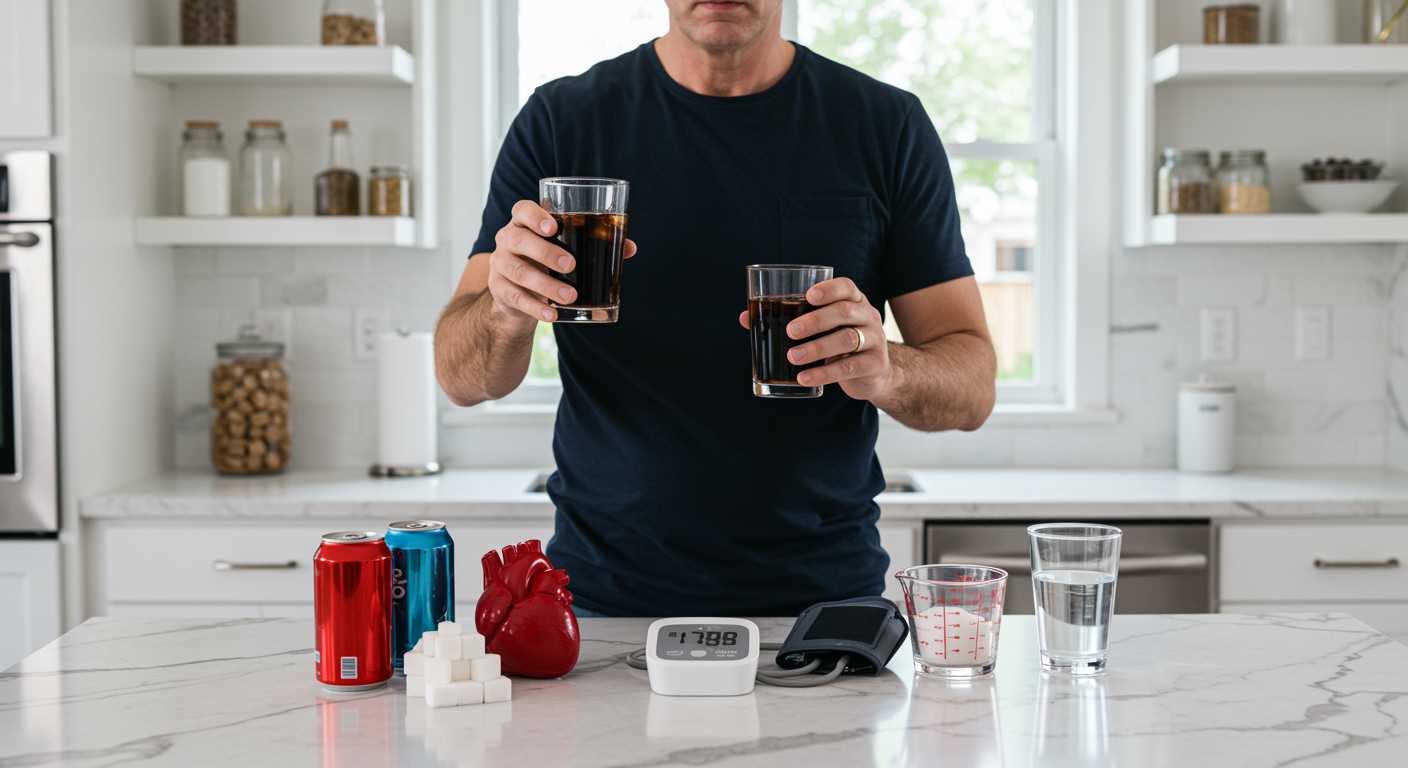✪ Key Takeaway: People with high blood pressure should avoid regular soda due to its high sugar and sodium content that can worsen hypertension.
Introduction
Your doctor just told you that your blood pressure is too high, and now you are wondering about every food and drink in your kitchen.
You might be asking this question because soda is one of the most popular beverages worldwide, yet many people with high blood pressure feel confused about whether they can still enjoy their favorite fizzy drinks.
Hi, I am Abdur, your nutrition coach, and today I am going to explain exactly why soda poses serious risks for people with high blood pressure and what you can do about it.
How Does Soda Affect Your Blood Pressure?
Regular soda contains massive amounts of added sugar that directly impact your cardiovascular system in multiple ways.
When you drink a can of soda, your body receives about 35-40 grams of sugar in liquid form, which gets absorbed into your bloodstream much faster than solid foods.
This rapid sugar absorption causes your insulin levels to spike dramatically, triggering a cascade of hormonal changes that affect your blood vessels.
High insulin levels activate your sympathetic nervous system, which increases your heart rate and causes your blood vessels to constrict.
The sodium content in most sodas, while not as high as in processed foods, still contributes to fluid retention and increased blood volume.
Research from Harvard Medical School shows that people who drink sugary beverages regularly have significantly higher systolic blood pressure readings compared to those who avoid them.
✪ Fact: One can of regular cola contains about 140 calories and 39 grams of sugar, equivalent to nearly 10 teaspoons.
What About Diet Soda and Artificial Sweeteners?
Many people think switching to diet soda solves the blood pressure problem, but the reality is more complicated than that.
Diet sodas contain artificial sweeteners like aspartame, sucralose, and acesulfame potassium instead of sugar.
While these sweeteners do not directly raise blood sugar like regular sugar does, some studies suggest they may still affect your blood pressure through different mechanisms.
The Mayo Clinic reports that some artificial sweeteners might interfere with your body’s ability to regulate blood sugar, which can indirectly impact blood pressure control.
Diet sodas also contain higher amounts of sodium than regular sodas, with some brands containing up to 40 milligrams per can.
The caffeine content in both regular and diet sodas can temporarily raise your blood pressure by 3-15 mmHg, especially if you are sensitive to caffeine.
Additionally, the phosphoric acid in diet sodas may interfere with calcium absorption, potentially affecting your cardiovascular health over time.
✪ Pro Tip: If you must drink soda occasionally, choose caffeine-free versions to minimize blood pressure spikes.
Why Does Sugar Impact Blood Pressure So Much?
The relationship between sugar and blood pressure involves several complex biological processes that many people do not understand.
When you consume large amounts of fructose from soda, your liver converts it into fat through a process called lipogenesis.
This process produces uric acid as a byproduct, which reduces the production of nitric oxide in your blood vessels.
Nitric oxide is crucial for keeping your blood vessels relaxed and flexible, so when its production decreases, your vessels become stiffer and narrower.
High sugar intake also promotes inflammation throughout your cardiovascular system, damaging the delicate lining of your arteries.
Over time, this inflammation leads to the buildup of plaque in your arteries, making your heart work harder to pump blood through narrowed passages.
The rapid blood sugar spikes from soda also trigger the release of stress hormones like cortisol and adrenaline, which directly increase your heart rate and blood pressure.
✪ Note: Your blood pressure can remain elevated for up to 4 hours after consuming a high-sugar beverage.
What Are Better Drink Options for High Blood Pressure?
The good news is that you have many delicious and healthy alternatives to soda that can actually help lower your blood pressure.
Water should be your primary beverage choice, as proper hydration helps your kidneys regulate blood pressure more effectively.
Adding slices of cucumber, lemon, or mint to your water creates natural flavor without any added sugars or artificial ingredients.
Herbal teas like hibiscus tea have been shown in studies to naturally lower blood pressure when consumed regularly.
Green tea contains compounds called catechins that help relax blood vessels and improve circulation.
Fresh vegetable juices, especially those made from beets, celery, and leafy greens, provide potassium and nitrates that support healthy blood pressure.
If you crave something fizzy, try sparkling water with a splash of 100% fruit juice or a few drops of natural flavor extracts without added sugars.
✪ Pro Tip: Aim to drink at least 8 glasses of water daily to help your kidneys manage sodium and maintain healthy blood pressure.
The Bottom Line
People with high blood pressure should definitely avoid regular soda and limit diet soda consumption due to their negative effects on cardiovascular health.
Your beverage choices are just as important as your food choices when managing blood pressure, and making simple swaps can lead to significant improvements in your health.
I would love to hear about your experience with reducing soda intake or any questions you might have about managing blood pressure through nutrition, so please share your thoughts in the comments below.
References
At NutritionCrown, we use quality and credible sources to ensure our content is accurate and trustworthy. Below are the sources referenced in creating this article:
- Harvard Health: Research were watching: Sugary drinks seem to raise blood pressure
- Harvard Health Blog: Sugary soda and juice can boost blood pressure, weight
- Mayo Clinic: Mayo Clinic Q and A: Diet soda and high blood pressure
- PubMed: Sugar-sweetened beverages and risk of hypertension





